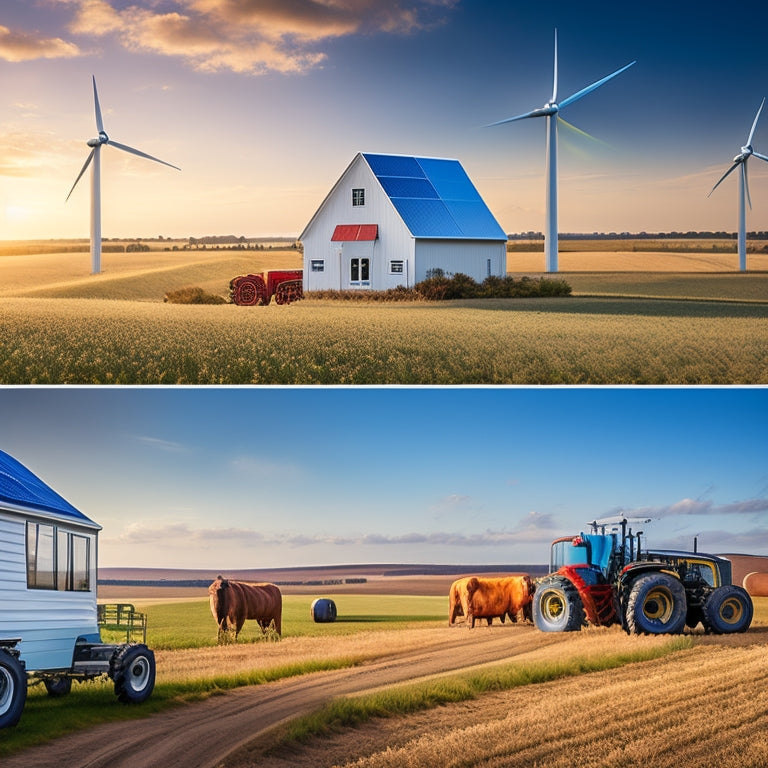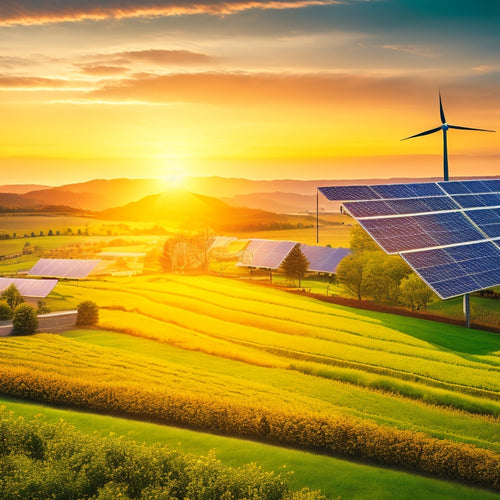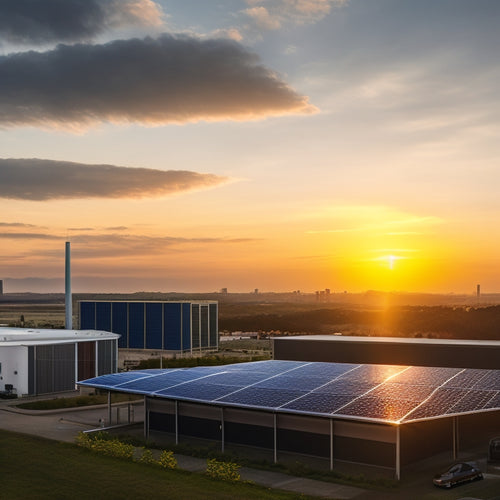
What Energy Storage Solutions Work for Farms?
Share
As a farmer, you need reliable energy storage solutions to guarantee uninterrupted operations. Battery backup systems can provide smooth power shift during outages. Solar power energy storage systems can harness free energy and reduce reliance on the grid. Renewable energy applications, such as solar-powered sensors and irrigation systems, can increase efficiency and lower costs. You can also consider off-grid farm energy solutions, like wind turbines and geothermal systems, for increased energy independence. Explore these options to optimize energy usage, reduce costs, and contribute to a sustainable future. By exploring further, you'll discover even more opportunities to energize your farm's productivity.
Key Takeaways
• Battery backup systems ensure uninterrupted farm operations during power outages and reduce risk of revenue loss.
• Solar power energy storage harnesses free solar energy, reducing reliance on the grid and lowering energy costs.
• Energy storage systems store excess energy for use during low sunlight or at night, optimizing energy usage and reducing costs.
• Renewable energy applications in agriculture, such as solar-powered sensors and renewable energy-powered farm robotics, lower carbon footprint and energy costs.
• Off-grid farm energy solutions, including wind turbines and geothermal systems, generate electricity independently, increasing energy independence and revenue streams.
Battery Backup for Farm Operations
When the grid goes down, a battery backup system can guarantee that critical farm operations, such as milking, irrigation, and refrigeration, continue uninterrupted. This is vital for maintaining farm efficiency and ensuring that daily tasks aren't disrupted.
With a reliable battery backup system, you can rest assured that your farm's operations will remain resilient, even in the face of power outages.
By incorporating a battery backup system, you can make sure that your farm's essential systems stay online, reducing the risk of lost productivity and revenue. This is particularly important for farms that rely on precision agriculture, where even brief power outages can have significant consequences.
By investing in a battery backup system, you're investing in the long-term resilience of your farm.
A well-designed battery backup system can provide a seamless shift between grid power and backup power, ensuring that your farm's operations continue uninterrupted. This not only enhances farm efficiency but also allows you to focus on what matters most – producing high-quality crops and livestock.
Solar Power Energy Storage Systems
By integrating a solar power energy storage system, you can harness the free energy from the sun to power your farm, reducing your reliance on the grid and lowering your energy costs. This setup allows you to generate electricity during the day and store excess energy for later use, ensuring a stable power supply even during periods of low sunlight or at night.
Solar power energy storage systems are particularly beneficial for rural farms, where access to the grid can be limited or unreliable. In fact, they can be a key driver of rural electrification, enabling farms to operate independently of the grid.
As the cost of solar panels continues to decline, achieving grid parity, the economics of solar power energy storage systems become increasingly attractive. By investing in a solar power energy storage system, you can lock in low energy costs for years to come, providing a competitive edge in the agricultural market.
With the right system design and installation, you can enjoy a reliable, renewable source of energy that supports your farm's operations and contributes to a more sustainable future.
Renewable Energy for Agricultural Use
Renewable energy sources, such as solar, wind, and hydro power, can greatly reduce your farm's reliance on fossil fuels, providing a cleaner and more sustainable option for powering agricultural operations. By harnessing these renewable energy sources, you can markedly lower your carbon footprint and reduce your energy costs.
Here are some ways you can utilize renewable energy on your farm:
-
Crop monitoring: Use solar-powered sensors to monitor soil moisture, temperature, and crop health, enabling data-driven decisions to optimize crop yields.
-
Farm robotics: Integrate renewable energy-powered autonomous farming equipment, such as drones and tractors, to streamline farm operations and reduce labor costs.
-
Irrigation systems: Power your irrigation systems with renewable energy, reducing your reliance on fossil fuels and minimizing your environmental impact.
- Energy storage: Combine renewable energy sources with energy storage systems, ensuring a stable and reliable power supply for your farm operations.
Off Grid Farm Energy Solutions
As you consider off-grid farm energy solutions, you'll want to evaluate renewable power systems that can efficiently generate and store energy for your farm's needs. Solar panel installations can provide a reliable source of renewable energy, but you'll also need energy storage systems to guarantee a stable power supply.
Renewable Power Systems
Your farm can harness the power of the sun, wind, or biogas to generate electricity independently of the grid with off-grid farm energy solutions. By leveraging renewable power systems, you can reduce your reliance on fossil fuels, lower your energy costs, and minimize your environmental footprint.
Here are some key benefits of renewable power systems for your farm:
-
Increased energy independence: Generate your own electricity and reduce your reliance on the grid.
-
Lower energy costs: Renewable energy sources like wind and biogas can be more cost-effective than traditional fossil fuels.
-
Environmental benefits: Reduce your carbon footprint and contribute to a more sustainable future.
- Diversified revenue streams: Consider selling excess energy back to the grid or using it to power other farm operations.
Wind turbines, for example, can be an effective way to harness wind energy and generate electricity.
Geothermal systems, on the other hand, can provide a reliable source of heat and hot water.
Solar Panel Installations
Installing solar panels on your farm can provide a clean and reliable source of energy, especially in areas with high sunlight exposure. By harnessing the power of the sun, you can reduce your reliance on fossil fuels and lower your environmental impact. Solar panels require minimal maintenance, making them an attractive option for farms with limited resources. They're also durable, with a typical lifespan of 25-30 years.
When considering solar panel installations, it's essential to assess your farm's energy needs and determine the suitable system size. You'll also need to ensure your farm has adequate space for the panels, ideally with minimal shading.
A well-designed solar panel system can provide a significant portion of your farm's energy requirements, reducing your energy bills and carbon footprint. By incorporating solar power into your farm's energy mix, you'll not only reduce your environmental impact but also contribute to a more sustainable future.
With the right installation, you can enjoy a reliable and clean source of energy, freeing up resources for other essential farm maintenance tasks.
Energy Storage Systems
You can greatly extend the benefits of your farm's solar panel installation by integrating energy storage systems that enable you to store excess energy generated during the day for use during periods of low sunlight or at night. This allows you to maximize your energy independence and reduce your reliance on the grid. Energy storage systems also provide grid resiliency, guaranteeing that your farm remains operational even during power outages.
Here are some key benefits of energy storage systems for your farm:
-
Increased energy independence: Store excess energy generated during the day for use at night or during periods of low sunlight.
-
Grid resiliency: Guarantee your farm remains operational during power outages with a reliable source of energy.
-
Microgrid capabilities: Integrate energy storage with your solar panel installation to create a microgrid, providing a reliable source of energy for your farm.
- Reduced energy costs: Optimize your energy usage and reduce your energy costs by storing excess energy for later use.
Efficient Energy Storage for Farming
By integrating efficient energy storage systems, farmers can greatly reduce their reliance on non-renewable energy sources and cut their energy costs. You can optimize your farm's energy consumption by implementing energy storage solutions that align with your farm's unique needs. This not only reduces your environmental footprint but also helps you save money on energy bills.
To get the most out of your energy storage system, it's essential to develop energy literacy within your farm workforce. This involves educating your team on how to monitor and manage energy usage, identify areas of inefficiency, and optimize energy storage to meet your farm's specific needs.
Alternative Energy for Rural Areas
Rural farms often rely on alternative energy sources, such as solar, wind, and biogas, to power their operations, reducing their dependence on diesel generators and lowering greenhouse gas emissions. As you explore alternative energy options for your rural farm, you'll find that these sources can provide a reliable and sustainable power supply.
Here are some benefits of alternative energy for rural areas:
-
Rural electrification: Alternative energy sources can provide electricity to rural areas where traditional grid connections are limited or non-existent.
-
Community engagement: Community-based renewable energy projects can foster community engagement and provide economic benefits to local communities.
-
Reduced energy costs: Alternative energy sources can reduce your energy costs and provide a stable power supply, helping you to manage your farm's energy expenses.
- Environmental benefits: By switching to alternative energy sources, you can reduce your farm's carbon footprint and contribute to a more sustainable future.
Farm Energy Independence Solutions
As you consider farm energy independence solutions, you'll want to explore renewable power systems that can greatly reduce your reliance on the grid.
You'll need to evaluate energy storage options that can effectively harness and store excess energy generated by these systems.
Renewable Power Systems
You can achieve farm energy independence by integrating renewable power systems, such as solar, wind, and biogas generators, into your farm's energy infrastructure. These systems harness natural resources to generate electricity, reducing your reliance on the grid and lowering your energy costs. Here are some benefits of renewable power systems for your farm:
-
Diversified Energy Portfolio: By integrating multiple renewable energy sources, you can guarantee a consistent energy supply and reduce your dependence on a single energy source.
-
Reduced Energy Costs: Renewable energy can greatly lower your energy bills, freeing up resources for other farm operations.
-
Increased Energy Security: With on-farm energy generation, you're shielded from grid outages and price volatility.
- Environmental Benefits: Renewable energy reduces your farm's carbon footprint, contributing to a more sustainable agricultural practice.
Wind turbines, for example, can be an effective way to generate electricity, especially for farms with large open spaces. Geothermal energy, on the other hand, can provide a reliable source of heat and power for your farm's operations. By incorporating these renewable power systems into your farm's energy infrastructure, you can achieve energy independence and reduce your environmental impact.
Energy Storage Options
Your renewable power systems can generate a significant amount of electricity, but without effective energy storage options, you may not be able to fully harness this power when you need it most. This is where energy storage options come in, providing a reliable and efficient way to store excess energy generated by your renewable power systems.
One innovative solution is Flywheel Technology, which stores energy kinetically in a rotating flywheel. When the grid demands power, the flywheel's kinetic energy is converted into electricity, providing a rapid and reliable response to power fluctuations.
Another promising option is Hydrogen Fuel, which involves converting excess energy into hydrogen through electrolysis. This hydrogen can then be stored and used to generate power when needed, providing a clean and efficient energy source.
Sustainable Farm Power Systems
Sustainable farm power systems integrate renewable energy sources, such as solar, wind, and biogas, to reduce dependence on fossil fuels and minimize environmental impact. As a farmer, you're likely considering ways to make your operation more sustainable and efficient. One key aspect of this is implementing a sustainable farm power system.
Here are some benefits you can expect from adopting sustainable farm power systems:
-
Reduced energy costs: By harnessing renewable energy sources, you can notably decrease your energy expenses.
-
Increased energy independence: With on-farm energy generation, you're less reliant on external energy providers.
-
Environmental benefits: Renewable energy sources produce little to no greenhouse gas emissions, supporting a cleaner environment.
- Improved farm productivity: With reliable and efficient energy, you can optimize farm operations, including precision agriculture and farm robotics.
Frequently Asked Questions
How Do Energy Storage Systems Impact Farm Insurance Premiums?
When you invest in energy storage systems, you'll likely see a premium reduction on your farm insurance due to improved risk assessment, as these systems minimize the risk of power outages and equipment damage.
Can Energy Storage Be Used for Animal Watering Systems?
You're likely aware that 1 in 5 farms globally face water scarcity; thankfully, energy storage can power animal watering systems, enabling efficient Water Conservation and streamlined Livestock Management, ensuring your farm's resilience.
Do Energy Storage Solutions Qualify for Agricultural Grants?
You'll be pleased to know that energy storage solutions can qualify for agricultural grants, and by employing savvy Grant Application Strategies, you can tap into Funding Opportunities, boosting your farm's energy independence and bottom line.
How Do I Determine the Right Energy Storage Capacity for My Farm?
To determine the right energy storage capacity for your farm, you'll need to conduct a load analysis and energy audit to identify peak energy usage periods, then calculate your energy storage needs based on those findings.
Are Energy Storage Systems Compatible With Existing Farm Infrastructure?
Coincidentally, your farm's unique layout and existing infrastructure can seamlessly integrate with energy storage systems, which can sync with the power grid, allowing you to optimize energy distribution and reduce waste.
Related Posts
-

Net Metering in Renewable Energy's Future
Net metering's future is vital for driving renewable energy growth and financial savings. You can reduce your electri...
-

Best Solar Powered Flashlights for Emergency Situations
When you're choosing the best solar-powered flashlights for emergency situations, focus on their brightness, battery ...
-

Advantages of Commercial Solar Battery On-Site Storage
By investing in a commercial solar battery on-site storage system, you can greatly reduce your energy grid dependence...


